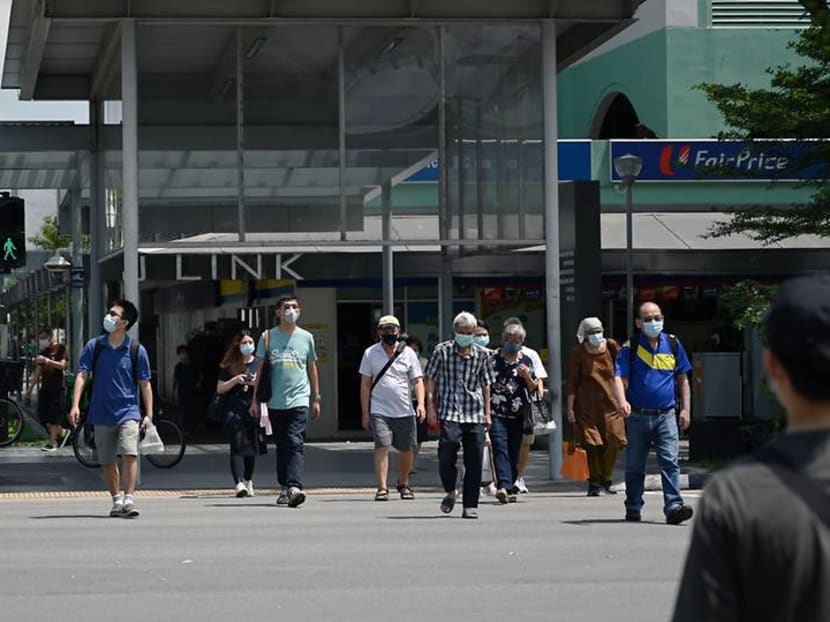Commentary: Relaxing rules for vaccinated a reasonable public health move but may have unintended consequences
The more challenging task is to pre-empt the complications and unintended consequences, say NUS' Dr Voo Teck Chuan and Dr Clarence Tam.

People wearing face masks while crossing a road on May 24, 2021, amid the COVID-19 pandemic in Singapore. (File photo: Marcus Mark Ramos)
SINGAPORE: Should public health restrictions be relaxed for COVID-19 vaccinated individuals but not for those unvaccinated?
This is something that some countries, such as Israel and France, have adopted. Others, including Singapore, are planning or considering it as COVID-19 vaccine uptake in the population increases.
Such differentiated measures have involved reducing or removing certain public health requirements for vaccinated individuals, such as mask-wearing in some settings.
They have also required making proof of vaccination a condition to access particular events, spaces or activities, for example, restaurants and gyms.
In addition, some countries have started implementing, or are considering, vaccination certificates as a pre-condition for the removal of certain restrictions, such as quarantine requirements for vaccinated travellers.
SOCIALLY AND ETHICALLY CONTROVERSIAL
Differentiated measures can help facilitate the reopening of society by making congregating less risky while incentivising vaccinations, but they are socially and ethically controversial.
On the one hand, they may be regarded as an objective way to classify people according to their risk of severe COVID-19 and the risk that they pose to others.
This has strong grounding in scientific evidence. We know that vaccinated individuals are at much lower risk of severe illness and death. They are also less likely to get infected and to infect others.
It therefore seems reasonable that vaccinated individuals should benefit from less restrictive measures, because they are at substantially lower risk of severe illness and pose less risk to others.
But not everyone is equally well-protected by vaccination. As the recent clusters associated with the Delta variant have shown, breakthrough infections in fully vaccinated people are possible, and vaccinated individuals can still transmit the virus to others.
So while in general vaccination lowers risk substantially, an individual’s vaccination status is not necessarily a reliable indicator of how much risk that they pose to themselves, or others if they catch COVID-19.
A negative polymerase chain reaction (PCR) test more accurately measures whether someone is likely to be infectious.
It may be safer to require a negative COVID-19 viral test at events involving large crowds, where it is challenging to enforce measures such as physical distancing and proper mask-wearing.
However, because test results are reliable only for a short time period, the need for repeated testing to access different activities and services could be overly burdensome. There are trade-offs if more convenient antigen rapid test (ART) test kits that typically come with a lower sensitivity are used.
Perhaps more convenient methods such as breathalyser tests might be widely employed if these receive approval from the Health Sciences Authority.
For now, vaccine certificates might be the most pragmatic way of minimising public health risks while reducing the compliance burden on businesses.
LIMIT NUMBER OF EXEMPTED INDIVIDUALS WHO CAN ACCESS GROUP ACTIVITIES
Aside from the risk of infection based on scientific evidence, due consideration has to be paid to striking a balance between the potential benefits and undesirable consequences, including the burdens of undifferentiated mass restrictions for individuals and businesses and the social values such policies promote.
One objection against differentiated measures is that they discriminate against unvaccinated individuals. This is unfair if broad sections of the population have not been offered the vaccine.
Even in Singapore, where a vaccine is widely available for those aged 12 years and above and 77 per cent have received at least one dose as of Aug 3, some remain unvaccinated through no fault of their own.
These include those unable to get vaccinated for medical reasons and younger children for whom COVID-19 vaccines have not been approved for use.
Efforts in the background to study whether more individuals can be vaccinated – like when the Expert Committee declared patients with transplants, HIV and those who have undergone cancer treatment can be vaccinated, and that people who suffered allergic reactions after the first dose of an mRNA vaccine can take Sinovac and be considered fully vaccinated – should keep up with the evolving science as more data becomes available to make vaccines more accessible.
To minimise unfair treatment, those who cannot be vaccinated could be issued an exemption from vaccination requirements to access services that implement differentiated measures.
Authorities must do their calculations on what levels of risk are acceptable. One possibility could be to limit the number of exempted individuals in group activities.
WHY NOT COMPEL PEOPLE TO BE VACCINATED?
Where authorities have said that COVID-19 vaccination will not be mandatory, those medically eligible and have access to COVID-19 vaccines but are unwilling may feel unfairly singled out by differentiated measures.
The reasons for hesitancy are complex and vary widely between individuals and settings. Understanding these reasons will allow us to engage them more effectively to address specific concerns.
They could perceive that requiring vaccination to access certain activities is unfair and coercive – a way to compel vaccination without making vaccination legally mandatory.
But coercion is not necessarily wrong if it is effective and necessary to achieve a legitimate public health goal. Tripartite guidelines released in July acknowledged the need for workers in higher risk settings to be vaccinated so economic activity can continue with lower risk and fewer impediments.
Still, given Singapore’s huge effort to encourage vaccination, the unvaccinated may unfortunately be seen as being socially irresponsible, but are nonetheless exercising their legal right to refuse vaccination.
Indeed, requiring vaccination to access certain activities could create a two-tier society that gives different freedoms and opportunities to vaccinated and unvaccinated individuals.
Why not allow dining in for those vaccinated? Public health experts discuss whether new rules mean prior plans to live normally with COVID-19 will shift on CNA's Heart of the Matter podcast.
UNINTENDED CONSEQUENCES
The other problem is we don’t know to what extremes vaccination status could be taken to.
There is a risk such stratification could become normalised, with people being required to disclose vaccination or other personal health information in contexts where it is less justifiable, such as to gain employment in low-risk settings or participate in after-school activities.
So while authorities mull over which activities require vaccination, they should also set forth rules on which activities should not require vaccination status to be disclosed. For example, vaccination should not be required to access essential goods and services, such as groceries and health services.
In those settings, other public health measures like crowd control limits can and have been implemented to reasonably reduce risk. This is also why mandatory mask-wearing will likely continue for the foreseeable future.
For access to higher-risk activities, other health credentials in place of proof of vaccination could be allowed.
In Israel, for example, a “green pass” to attend large events and enter certain public spaces is issued to those fully vaccinated, have recently recovered from COVID-19, or receive a negative PCR test in the last 72 hours.
It is also crucial that any differentiated measures are implemented with strong justification and are time-limited, with clearly spelled-out metrics to determine if, whether and when these policies can be removed.
WHAT ABOUT INDIVDIUALS VACCINATED WITH NON-HSA APPROVED VACCINES?
Singapore does not count Sinovac recipients in vaccine uptake statistics. It is unclear if they will be granted similar rights as mRNA vaccine recipients despite exercising the same level of social responsibility in getting vaccinated.
Ahead of the Government’s announcement that Sinovac-jabbed individuals would not be considered vaccinated, many were not given an inkling of this implication when the Special Access Route was opened.
The Government has stated that people with a severe allergic reaction to a first mRNA vaccine dose can take Sinovac as a second dose and be considered fully vaccinated. What remains unclear is how they will be received overseas, where other countries might have their own conditions for entry and movement.
The waters are murkier where global vaccine shortages and concerns over serious adverse effects for some vaccines are forcing many countries to vaccinate people with doses of two different vaccines.
Selectively easing restrictions for vaccinated individuals may seem like a reasonable way to reduce public health risk, but we should be aware of the immediate and long-term consequences of such policies, and what freedoms and values we could be giving up without due consideration and checks.
Dr Voo Teck Chuan is an Assistant Professor at the NUS Centre for Biomedical Ethics, Yong Loo Lin School of Medicine. Dr Clarence Tam is an Assistant Professor at the Saw Swee Hock School of Public Health under the National University of Singapore.













